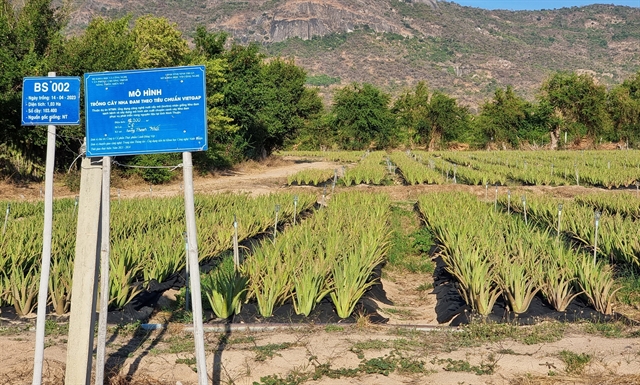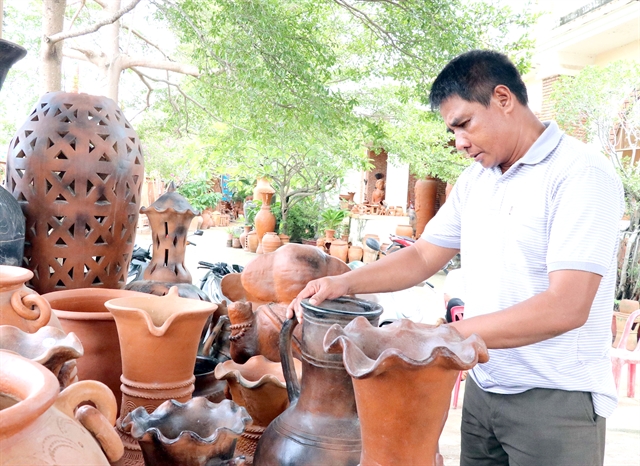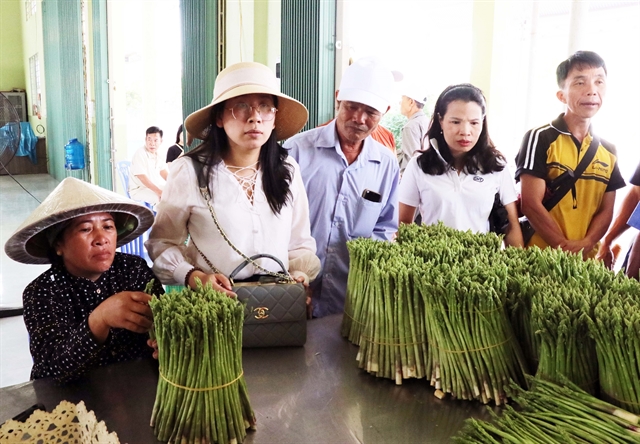 Society
Society

 |
| The Chăm Bàu Trúc Pottery Co-operative’s products in Ninh Thuận Province’s Ninh Phước District. Its products were recognised as national outstanding rural industrial goods in 2023. – VNA/VNS Photo Công Thử |
NINH THUẬN – Ninh Thuận Province has expanded its number of co-operatives and improved their operational quality.
The south-central province established five new co-operatives in the first seven months of the year, bringing the total number to 126, according to its Department of Planning and Investment.
The 126 co-operatives have more than 19,000 members and operate in sectors such as agriculture, industry, transport, credit, and other services.
Lê Hoài Nam, chairman of the Provincial Co-operative Alliance, said: “The province’s co-operatives have operated stably and developed.”
Many new-style co-operatives operating under the Co-operative Law effectively linked with companies, confirming their key role in developing the local economy, he said.
They restructured the cultivation of crops and the breeding of animals, focusing on producing commercial products.
The Nam Miền Trung High-tech Agriculture Co-operative in Bác Ái District has successfully cultivated honeydew melon and watermelon in greenhouses on a total of five hectares.
It partners with farmers to grow these fruits, supplying input materials and farming techniques to them, and purchasing their produce.
It earns a profit of VNĐ250-300 million (US$8,000 - 12,000) a year.
An increasing number of co-operatives have adopted advanced techniques to produce high-quality products that meet market demand.
The Thanh Hải Agricultural Services and Agricultural Product Trading Co-operative in Ninh Hải District grows red onion and Phan Rang garlic to Vietnamese good agricultural practices on a total of 20 hectares, with 103 members participating.
Nguyễn Thị Hạnh, its director, said the co-operative also bought Phan Rang garlic from other farmers in neighbouring communes such as Nhơn Hải, Vĩnh Hải, and Phan Rang - Tháp Chàm City.
The co-operative used origin stamps and developed a logo and label for its products, she said.
Farmers growing Phan Rang garlic earned a profit of VNĐ60 - 70 million ($2,400 - 2,800) per 1,000 sq.m a year, she added.
Thanh Hải, along with two other co-operatives in the province, has been granted the right to use the collective brand name "Phan Rang flavour of sun and wind" for their fresh and dried garlic products.
Phan Rang garlic is one of the province’s 12 specifically identified products along with grapes, jujube, asparagus, aloe vera, sheep, and goats.
Co-operatives in the province have produced many products under the national “One Commune - One Product” (OCOP) programme.
Nguyễn Đức Tùng of the Thái An Agriculture General Service Co-operative in Ninh Hải District’s Vĩnh Hải Commune said: “The co-operative has eight fresh and processed grape products recognised as OCOP products with three and four stars.”
This recognition increased consumer awareness of the co-operative’s products, enhanced its reputation and helped it expand its market, he said.
It also offered tourism services, such as grape orchard tours, grape product processing demonstrations, and tastings, he added.
 |
| 1. Tourists visit the Tuấn Tú General Service Co-operative in Ninh Thuận Province’s Ninh Phước District. The co-operative’s asparagus products have been recognised under the country’s “One Commune - One Product” programme. – VNA/VNS Photo Công Thử |
Support
Ninh Thuận Province is helping effective new-style co-operatives expand production and grow their business models.
Trịnh Minh Hoàng, deputy chairman of the province People’s Committee, said the development of new-style co-operatives was important for building trust among individuals and companies, enabling collaboration and raising public awareness of the collective economy's role and importance.
Under its plan to develop them, the province has selected four efficient co-operatives to participate in the programme in 2021-25, the Tuấn Tú General Service Co-operative and the Chăm Bàu Trúc Pottery Co-operative in Ninh Phước District, the Ninh Thuận Evergreen Grape Co-operative in Phan Rang – Tháp Chàm City and the An Xuân Agriculture Trade and Production Co-operative in Ninh Hải District.
The four have a large number of members and actively participate in community activities as part of the new-style rural area programme.
They produce the province’s specially identified products, partner with companies to ensure sales of their products, develop value chains for their produce, adopt advanced science and technology, and have a high proportion of female members.
Relevant provincial departments and agencies have promoted regulations for the collective economy and assisted these co-operatives with recruiting young, highly skilled labour to improve their human resource quality.
The province has also provided them with access to low-interest loans for production, and supported efforts to enhance product quality to comply with Vietnamese and global good agricultural practices, the OCOP programme and export standards.
Three of the four co-operatives have had eight products recognised under the OCOP programme.
The province has also helped co-operatives apply advanced technologies and develop packaging, labels, brand names, origin traceability, and quality certifications for their products.
In 2024-25 the province is mobilising resources to assist these co-operatives in investing in infrastructure and production facilities. – VNS




